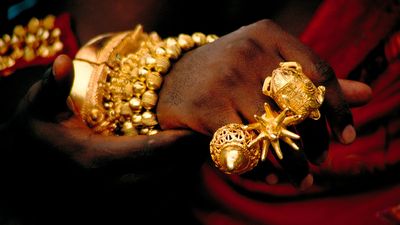The UK is Sending Back Ghana’s Looted Treasures on Loan
The Asante Kingdom’s royal gold are among the items returning to Ghanaians in a deal that many on social media have faulted.
The United Kingdom is set to return 32 looted items to Ghana. It’s a loan deal that will see both nations partake in exchange of Ghana’s cultural treasures and artifacts that were forcefully taken 150 years ago during the 19th-century colonial wars between the British and the Asante Kingdom.
A ceremonial cap worn by courtiers at coronations, an Asante gold ring, and a gold badge worn by the king’s “soul washer” are amongst the historical belongings museums in the U.K. are lending back. Fifteen of them will come from the British Museum while seventeen are set to be dispatched from the Victoria & Albert Museum.
Director of the V&A, Tristram Hunt, told the BBC, “When objects with origins in war and looting in military campaigns, we have a responsibility to the countries of origin to think about how we can share those more fairly today. It doesn’t seem to me that all of our museums will fall down if we build up these kind of partnerships and exchanges.”
Hunt has clarified that the deal between the U.K. and Ghana isn’t permanent restitution, as the gold items will head back to the U.K. after a three-year period, with an option to extend further. The loan agreement wasn’t made with the Ghanaian government, but with Otumfo Osei Tutu II, the current king of Asante royalty known as the Asantehene, who was present for King Charles’ coronation in 2023.
“Loaned back when it was stolen from us? Bring it to Kumasi, and we will see afterwards.....siafoɔ,” @Enoch_Kojo said on X (formerly Twitter), responding to the “landmark” loan deal.
This is a first of many disapproving comments from Ghanaians on social media, who believe that using the word “loan” implies that ownership doesn’t belong to Ghana.
“You passed laws to claim ownership of stolen items. We are going to demand everything,” @amankwaa_amoako chimed in while @Ghazy____ said: "How do you loan something you stole? Return them to the rightful owners!!”
“It's funny how someone who stole my goat is now loaning my own goat to me. Hahaha,” said @RealEssuman.
Ghana’s looted artifacts open age-old wounds on the ugliness of extractive colonialism, and leans into the wider public debates around cultural restitution, reparations, and the decolonization of museums.
It’s sharply reminiscent of the Benin bronzes, pillaged from the Benin Kingdom in Nigeria by the British in 1897 — a source of cultural friction between the U.K. and Nigeria that has renewed calls for their return.- Major European Museums Plan To 'Loan' Stolen Benin Bronzes Back To a New Museum Opening in Nigeria ›
- The Netherlands Returns Nigeria's Centuries-Old Stolen Artefact ›
- US Returns Looted Benin Bronzes to Nigeria ›
- London's Horniman Museum May Return Nigeria's Looted Benin Bronzes ›
- Benin Bronzes Will Be Exhibited One Last Time Before Return to Nigeria ›
- Germany To Return Nigeria’s Stolen Bronzes ›
- A Tale of Ghana’s Fabled Fortune ›
